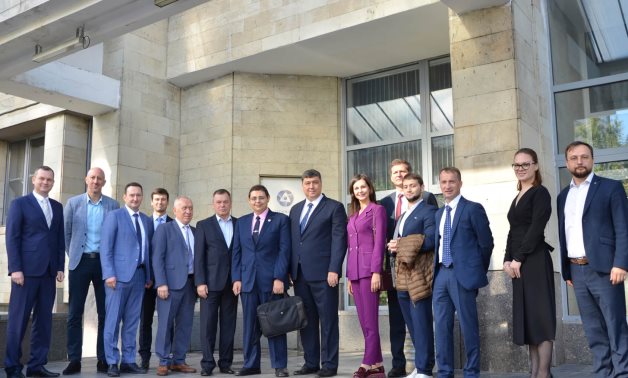
The first groups of specialists from Egypt’s El-Dabaa Nuclear Power Plant and Russian officials pose for a photo in St. Petersburg- Press photo from the Rosatom Technical Academy
CAIRO - 13 September 2021: The Rosatom Technical Academy has started training for the first groups of specialists from Egypt’s El-Dabaa Nuclear Power Plant (Egypt’s 1th NPP)at the St. Petersburg branch of the academy, according to a statement from the academy issued on September 9, 2021.
The training program comes within the framework of contracts related to the construction of the El-Dabaa plant, the statement said.
“Rosatom will train about 1,700 specialists in the framework of this program by 2028. The program will take place at both Rosatom Technical Academy in Russia and the Nuclear Power Plant Training Centre in Egypt,” the statement read.
The program starts with a six-month Russian language course, which will be provided for 465 Egyptian students, Afterwards, the first team of specialists will take the “theoretical training course on the basis of a reference Rosatom nuclear power plant and will undergo practical training and internships at Leningrad NPP-2 and at other workplaces,” the statement continued.
In 2014, Egypt and Russia announced their cooperation in the nuclear power field. On November 19, 2015, an agreement was finally signed between Cairo and Moscow that allows Russia to build a nuclear power plant in the Mediterranean city of Dabaa, with Russia extending a $25 billion loan to Egypt to cover the cost of construction. The loan will cover 85 percent of the plant, with Egypt funding the remaining 15 percent.
According to the deal, Rosatom finances and constructs four third-generation reactors, with a capacity of 1,200 megawatts (MW) each, for a total of 4,800 MW. The plant will be built on approximately 12,000 feddans and is expected to create over 50,000 job opportunities.
Nuclear energy is part of the government’s plan to diversify its energy sources to prevent any future crisis resulting from shortages in electricity.

Comments
Leave a Comment